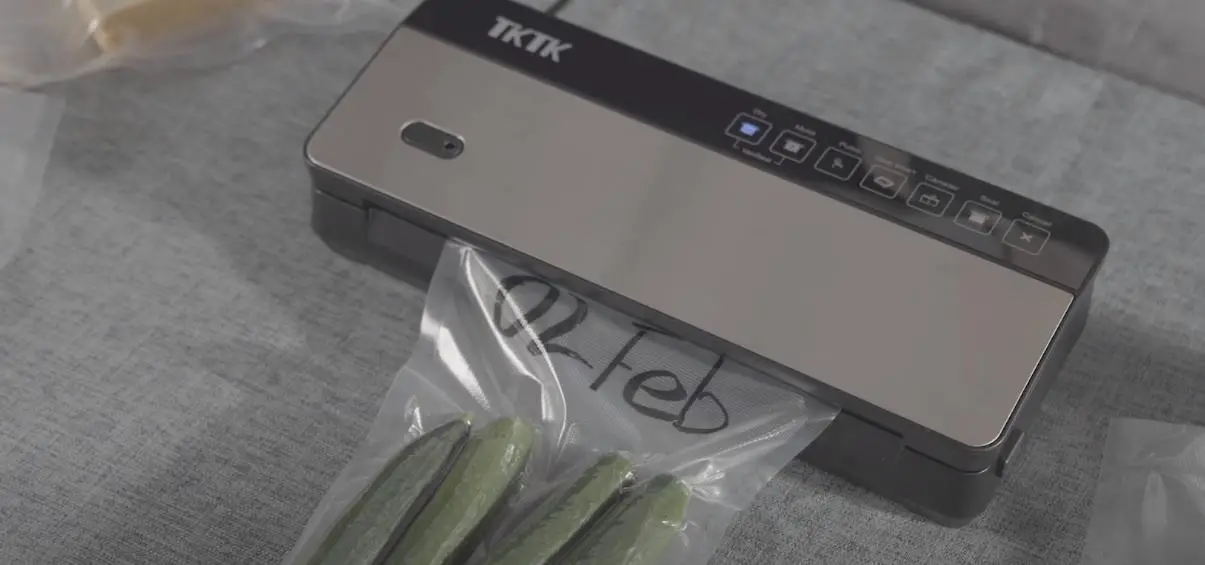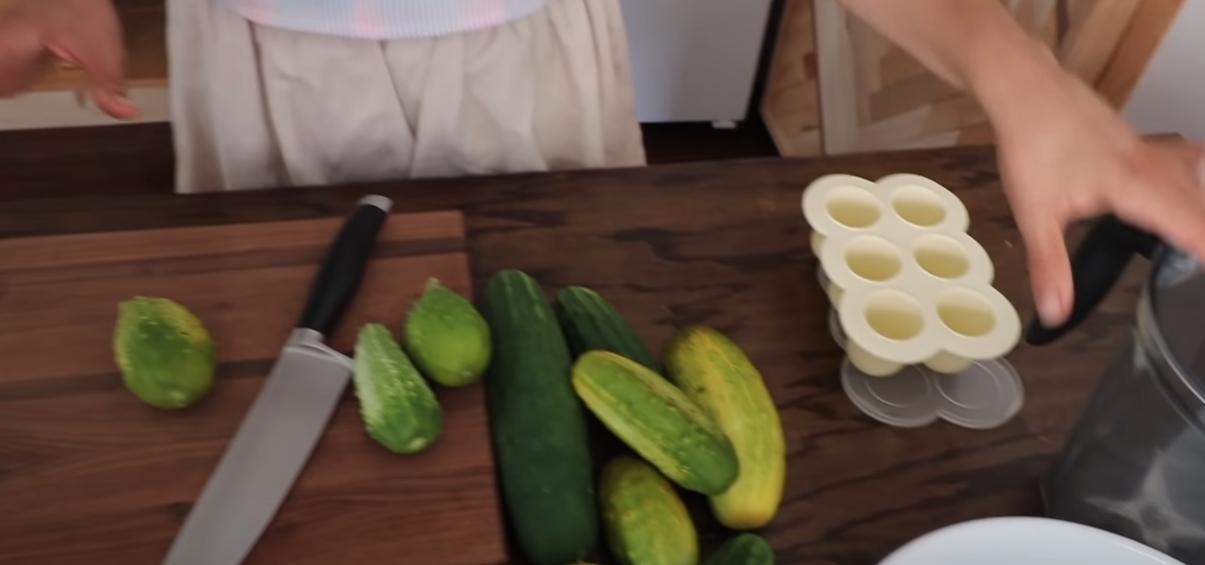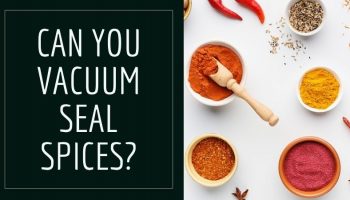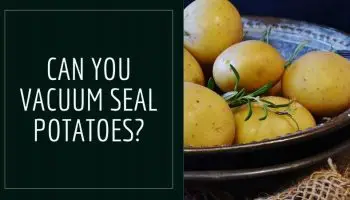Key Takeaways
- You can vacuum seal cucumbers to preserve them for an extended period
- Vacuum-sealing cucumbers can result in crunchier cucumbers
Vacuum-sealing cucumbers is a great way to extend their shelf life and keep them fresh for longer.
But how do you vacuum seal cucumbers correctly, and are there any vegetables that shouldn’t be vacuum sealed?
Read on to find out the answers to these questions and more.
Can you vacuum seal cucumbers?
Cucumbers are a great vegetable to vacuum seal.
This is because they are very crisp and fresh, and they will stay that way for an extended period of time.
Vacuum-sealing cucumbers can also result in a crunchier cucumber, which some people prefer.
How do you vacuum seal cucumbers?
Vacuum sealing is a great way to keep cucumbers fresh and preserve them for later use.
To vacuum seal cucumbers, first cut them into slices or diced pieces. Then lay them out on a flat surface and cover them with a thin layer of plastic wrap.
Next, use your vacuum sealing machine to seal the cucumbers in the plastic wrap.
If you have a pulse option on your machine, it is best to use that setting when sealing cucumbers so that they do not become over-compressed and turn into mush.
What are the benefits of vacuum-sealing cucumbers?
The benefits of vacuum-sealing cucumbers are many and varied. For one, they stay fresher for longer periods of time.
This is due to the lack of oxygen in the sealed environment, which slows down the process of decomposition.
Secondly, cucumbers (and other vegetables) don’t dry out as quickly when vacuum sealed. This is because the moisture is trapped inside the seal, rather than being allowed to evaporate.
Finally, vacuum sealing provides an extra layer of protection against bacteria and other contaminants.
When food is sealed in a chamber vacuum sealer, it creates a strong barrier that keeps out unwanted elements.
Vacuum-sealing vegetables are not only beneficial for individual consumers, but also for businesses. It saves time and money by reducing spoilage and extending shelf life.
Furthermore, it helps promote healthier eating habits by making it easier to portion out fresh produce and cook them within a short timeframe.
In today’s fast-paced world, convenience is key – and vacuum sealing offers a convenient way to enjoy healthy meals without sacrificing taste or quality.

Why should you vacuum seal cucumbers?
Vacuum-sealing cucumbers is a great way to preserve them and keep them fresh for an extended period.
There are several benefits to vacuum sealing cucumbers, including extending their shelf life, preventing freezer burn, and protecting against mold and bacteria.
Cucumbers are delicate fruit, and they can begin to spoil quickly if not properly stored.
Vacuum sealing cucumbers helps to extend their shelf life by keeping out oxygen and moisture that can cause rot. It also prevents freezer burn by creating an airtight seal that locks in moisture.
And finally, it protects against mold and bacteria growth by creating an environment that is inhospitable to these organisms.
Where can I buy a vacuum sealer for cucumbers?
If you’re looking for a vacuum sealer specifically for cucumbers, Amazon.com is a good place to start your search.
However, any good quality vacuum sealer will do the trick when it comes to sealing cucumbers (or any other food).
Vacuum sealing is an effective way to keep cucumbers (and other fruits and vegetables) fresh for a longer period of time.
By removing the air from around the cucumbers, you prevent them from spoiling as quickly. This means that you can enjoy fresh cucumbers for days or even weeks after they’ve been sealed!
There are many different ways to seal cucumbers, but using a vacuum sealer is generally considered to be the best method. If you’re interested in trying out this method of food storage, be sure to check out Amazon.
How long will vacuum-sealed cucumbers last?
Vacuum sealing is a great way to extend the shelf life of your cucumbers.
Vacuum-sealed cucumbers will last for several weeks in the fridge and around 8 months in the freezer.
Do I need to wash my cucumbers before vacuuming them?
While many people believe that vacuum sealing cucumbers (or any other vegetables for that matter) requires extensive cleaning beforehand, this is actually not the case.
A quick rinse will suffice – no need to go overboard and scrub each cucumber clean. In fact, over-washing can actually reduce the shelf life of your vegetables as it strips away their natural protective oils.
So next time you’re getting ready to seal up a batch of cucumbers, just give them a quick rinse and pat dry before adding them to your vacuum sealer bag.
Can I add spices or other seasonings to my pickled cucumber recipe if they’re going to be sealed in a jar?
If you’re pickling cucumbers, you might be wondering if you can add spices or other seasonings to the mix. The good news is that you can absolutely add spices to your pickled cucumber recipe if you’re going to seal the jars.
There are a few things to keep in mind when adding spices to pickled cucumbers.
First of all, make sure that any spices you add are food-safe and have been properly processed.
Secondly, keep in mind that the longer the cucumbers soak in the brine, the more pronounced the flavors of the spices will be.
So if you want a subtle flavor, add the spices closer to sealing time. If you want a stronger flavor, give them more time to infuse into the cucumbers.
When it comes to which spices to use, it’s really up to your personal preference. Some common picks include dill, mustard seed, peppercorns, and chili peppers.
What’s the difference between fresh and pickled cucumbers, and how can I tell which one is better for my needs?
Vacuum sealing is the process of using an airtight seal to remove all the air from a food storage container. The main purpose of vacuum sealing is to keep food fresh for a longer period of time.
Vacuum-sealed containers are also great for space-saving as they can be stored in a smaller area.
There are two types of cucumbers: fresh and pickled. Fresh cucumbers have not been soaked in vinegar or brine, whereas pickled cucumbers have.
Pickling cucumbers are typically shorter, thicker, and more uniform than slicing cucumbers. They also have thinner skins and are longer and leaner than salad cucumbers.
The freshness of the cucumber will make a difference in the quality of your pickle, so it’s important to choose ones that are firm and free of blemishes. Dwarf-pickling cucumbers do well in containers.
When vacuum sealing pickled cucumbers, make sure to leave some headspace at the top of the container so that the brine can expand without causing leaks.

How can I store my freshly picked or homegrown cucumbers so that they’ll stay crunchy and delicious all year round?
If you’re looking for a way to keep your cucumbers fresh and crunchy all year round, vacuum sealing is the way to go.
Vacuum sealing will prevent oxygen from getting to the cucumbers, which will help them stay fresh for weeks or even months.
Plus, it’s a great way to store homegrown cucumbers so you can enjoy them all year long.
To vacuum-seal cucumbers, simply wash and dry them before storing them in a vacuum-sealed bag.
Be sure to refrigerate cut cucumbers and consume them within two to three days.
Final Verdict
Yes, you can vacuum seal cucumbers. This is a great way to preserve them and keep them fresh for a more extended period. Vacuum sealing cucumbers prevents them from exposure to oxygen, which can cause them to spoil quickly. Additionally, it helps to prevent the growth of mold and bacteria.



![Can You Vacuum Seal Tomatoes? [The Proper Way!]](https://vacuumsealerzone.com/wp-content/uploads/2021/08/Can-You-Vacuum-Seal-Tomatoes-350x200.jpg)